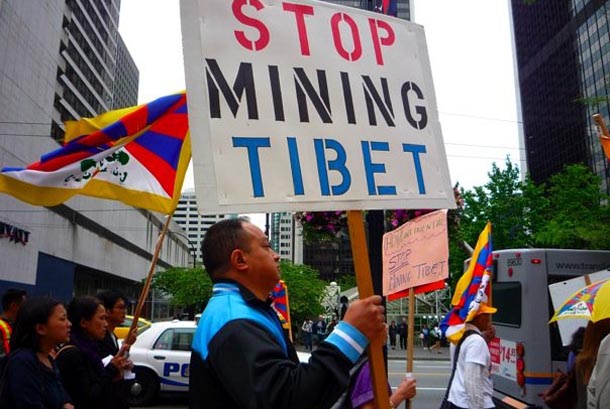 Dharamshala:- The protest action against Chinese miming projects in Markham's county resulted in one local being shot and six others detained. On the 15th of August, a group of 1000 Choeten residents marched to a new mining site to prevent upcoming project on the environmental grounds.
Dharamshala:- The protest action against Chinese miming projects in Markham's county resulted in one local being shot and six others detained. On the 15th of August, a group of 1000 Choeten residents marched to a new mining site to prevent upcoming project on the environmental grounds.
This act of protest was stopped by the Chinese authorities and police who used tear gas and live fire on gathered crowd. The clash ended in protester Nyima being killed by gunfire, states Radio Free Asia (RFA) report.
"He was surrounded by the security forces, and none of the Tibetans could approach him. Many other protesters ran away into the forest to hide and have not returned home", states Lobsang Palden, a monk from South India, citing contacts in the region.
Six other demonstrators were captured and detained during this mining protest. Five of them were identified as Dawa, Atsong, Phuntsong Nyima, Jamyang Wangmo and Kelsang Yudron while one still stays unknown.
The Chinese mining company, which is believed to be a private rather that governmental company, insists that Tibetans cannot stop the project proceeding forward, since it works under the government orders. The works started at the beginning of this year in Markham but was stopped by opposing residents of Choeten, a township of about 11 villages and 3,000 residents, declared Lobsang Palden.
Yet, "Yesterday, [the Chinese] came back again, saying that mining would go ahead". They also proclaimed that they work towards building an electrical power plant and not extracting natural resources. According to Palden, "[the] work site is on a forested part of the mountain, so the local people don't believe them".
In 2011, Chinese official media reported that over the next five years, Tibet Autonomous Region will experience increased mining of natural resources. Recent studies showed that Tibet's area is rich in chromium and copper reserves while it also could have unexploited iron, gold, silver, potassium, oil and natural gas.
So far, all recent mining works were met disapprovingly by Tibetans. The Chinese mining businesses were accused of disturbing holy and spiritual sites which have major significance for locals. And finally, this type of excavations are polluting environment as they extort Tibet's richness. "Tibetans [...] have long resisted mining operations, which they believe are bad for the environment," said Lobsang Palden.
It appears that the protests against mining works possibly will continue to occur as Tibetans strive to preserve their land and its sources.


![Tibet has a rich history as a sovereign nation until the 1950s when it was invaded by China. [Photo: File]](/images/stories/Pics-2024/March/Tibet-Nation-1940s.jpg#joomlaImage://local-images/stories/Pics-2024/March/Tibet-Nation-1940s.jpg?width=1489&height=878)















